Pennsylvania
Angler researches lowering lakes from the bottom to cool waters and help trout survive
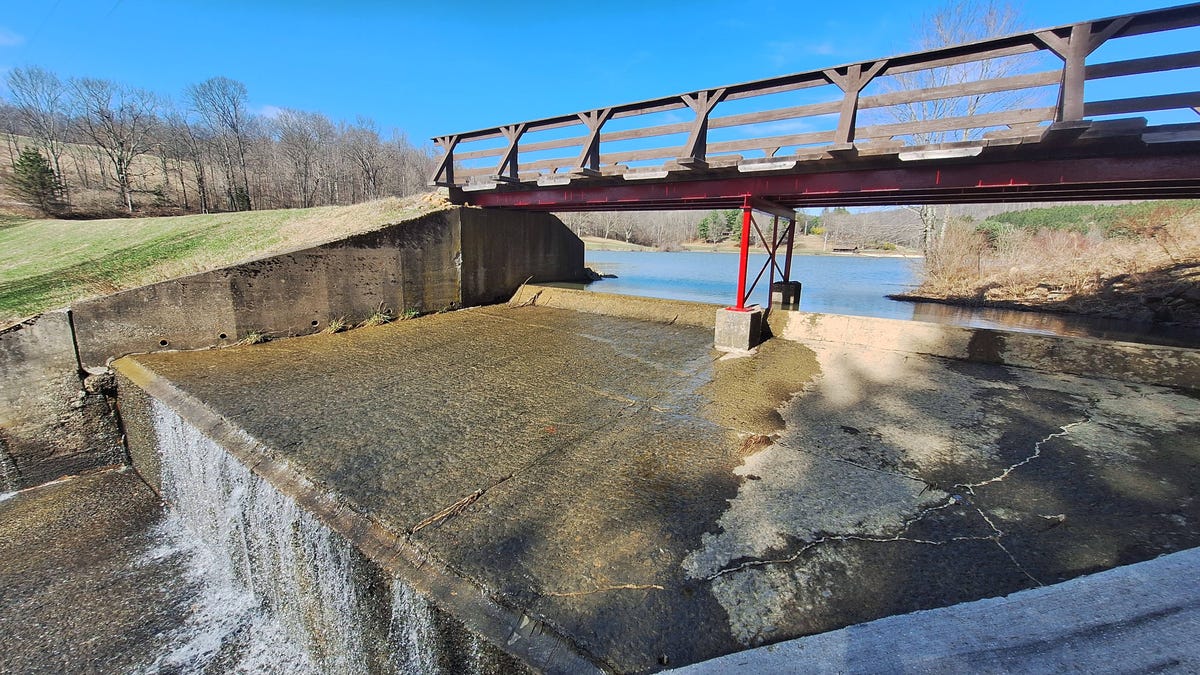
Huntsdale State Fish Hatchery produces more than 500,000 trout
Andrew Wagner, Huntsdale State Fish Hatchery manager, talks about how trout are produced and raised for public waterways.
Brian Whipkey, Erie Times-News
An avid angler believes allowing more water to be released from the bottom of lakes will give coldwater fish like trout a better chance to survive the hot summer months.
“I would notice that Laurel Hill Creek would super heat in the really warm months of summer,” said John MacDonald, 66, of Rockwood, Somerset County.
“The trout would suffer horribly, many would die and the ones that didn’t, took refuge downstream and left the area.”
In the heat of the summer, MacDonald would wear snorkeling gear and swim down the creek looking for fish.
“I noticed they would hide in the deeper pools,” he said, “and I would find a cold water spring down there, that they were all huddled up against.”
Ongoing research
About five years ago, he approached Camp Soles, a nearby children’s camp, about opening their lake’s bottom drain pipe to release some of the colder water to see how that would impact the temperature of the water flowing downstream. The camp’s 18-acre lake flows into Lost Run and then into Laurel Hill Creek.
“We had to make sure that at all times that water flowed over the top for the health of the lake,” he said. “We had to find a blending point which let water over the top, but enough cold water off the bottom to bring (the temperature) down,” he said.
Let’s go fishing: A look at what you need to know to fish for trout this spring across Pennsylvania
He started measuring the temperature of the water at several locations, including in Lost Run before it reached the lake, in the lake itself and then several spots down stream.
During the heat of the summer, he said water coming into the lake would be below 70 degrees. The water flowing over the spillway would oftentimes be 80 degrees or more and the water below where the spillway and bottom pipe blend in Lost Run would be back down to below 70.
“We are able to get to the same temperature below the dam as it was coming into the lake,” he said “We were actually able to get to that same point, as though the dam wasn’t there,” he said.
Susan Fletcher, president of the Friends of Camp Soles board of directors, has been observing MacDonald’s efforts.
“It’s not only that the fish are more vigorous and survive better, but there’s something about what they feed on that has improved,” she said.
Fletcher said MacDonald is a friend of the camp and they appreciate his efforts.
“He’s clearly interested in the environment and when you have a summer camp, that’s what you want the kids to do, is to appreciate the natural world,” she said.
She said the dam was named Lake Tris for a descendant of the camp’s founders. She said there are online references to the waterway that have it also spelled as Lake Triss. “It’s hard to get that changed,” she said.
“One of the most popular things in recent years has been fishing,” she said about the campers enjoying the lake to catch catfish, bass and a variety of panfish.
“We love that John has taken an interest and is keeping (the lake) healthy. Because one of my favorite sayings is, when you tug at one thing in nature, you find it attached to the rest of the world.”
This year, MacDonald is continuing his research with recording temperatures and studying the ratio of water coming over the spillway with the water being released from the bottom of the lake. He also wants to measure water volume, too.
More: Pennsylvania fishing license fees to remain same in 2025 because of increased sales
“Once I establish the ratio of what is needed, other lakes with a spillway and bottom pipe, can experiment with how far to open the pipe each year,” he said about making it a simple process for people to mimic or at least try.
He said he’s not changing the amount of water being released, but blending the two sources of water discharge.
With the help of Camp Soles, he said the goal is to, “Someday find a very simple solution for these types of lakes to bring the water temperature down below 70, and protect our cold water heritage.”
MacDonald isn’t officially trained to study waterways, but said he’s an avid sportsman who wants to protect the fishery. He’s hoping his research can be used by state agencies and private lake owners “for the betterment of our cold-water heritage.”
State agency response
Lakes in Pennsylvania are managed by the Pennsylvania Department of Environmental Protection.
Lauren Camarda, regional communications manager for the DEP, said, “A cold water, low-level discharge is not always required or beneficial, but many dams have been retrofitted with cold water releases over the years. While there could be benefits from discharging from the bottom, it could have the unintended consequence of releasing anoxic water (water with low levels of dissolved oxygen that fish need), sediment that can pollute the water downstream, or entrapping or impinging fish in the lake.”
If the lake has to retrofit its pipes on the bottom of a lake it can be cost prohibitive based on what is needed.
“Simply ‘cracking open’ the low-level valve is generally not a viable solution as high velocity flow could be detrimental to the valve and debris may lodge in the valve preventing it from being able to shut,” she said through an email. “If a dam owner wants to change normal operation of the pool level, a permit is required from DEP. DEP’s division of dam safety consults with the Pennsylvania Fish and Boat Commission regarding situations where a cold-water release requirement may be warranted. Ultimately, this idea may have merit in certain situations but must be approached on a case specific-basis and in concert with DEP review to ensure that it is in fact beneficial for aquatic life downstream. DEP encourages dam owners that are interested in this to contact DEP to determine if it is something that could work for them.”
Mike Parker, communications director for the Fish and Boat Commission agreed that colder water may help trout survive the summer months, but referred questions about lowering lakes to achieve that to the DEP.
Brian Whipkey is the outdoors columnist for USA TODAY Network sites in Pennsylvania. Contact him at bwhipkey@gannett.com and sign up for our weekly Go Outdoors PA newsletter email on this website’s homepage under your login name. Follow him on Facebook @whipkeyoutdoors, and Instagram at whipkeyoutdoors.

Pennsylvania
Trump's former doctor gives health update, calls out Wray as FBI affirms bullet struck former president

A former White House doctor released a letter Friday stating that former President Trump is “rapidly recovering” following the July 13 shooting at a campaign rally in Pennsylvania and that there is “absolutely no evidence” he was hit with “anything other than a bullet.”
Rep. Ronny Jackson, R-Texas, who took issue with testimony given earlier this week by FBI Director Christopher Wray, said “I want to reassure the American people and the rest of the world, that President Trump is doing extremely well.”
Jackson, who is Trump’s former physician, said, “I have continued to monitor his health and well-being, along with his primary care physician, since the assassination attempt in Butler, Pennsylvania, on the evening of July 13th.
“During the Congressional Hearing two days ago, FBI Director Christopher Wray suggested that it could be a bullet, shrapnel, or glass. There is absolutely no evidence that it was anything other than a bullet,” he added. “Congress should correct the record as confirmed by both the hospital and myself. Director Wray is wrong and inappropriate to suggest anything else.”
Wray did not mention glass in his testimony. He said, “With respect to former President Trump, there is some question about whether it was a bullet or shrapnel that hit his ear.”
After Jackson’s letter was released, the FBI issued its own statement to Fox News Digital, “What struck former President Trump in the ear was a bullet, whether whole or fragmented into smaller pieces, fired from the deceased subject’s rifle.”
“The would-be assassin fired multiple rounds from a relatively close distance using a high-powered rifle, with one bullet striking the former President, and now the Republican Nominee for President, in his right ear,” Jackson continued.
FBI WANTS TO INTERVIEW TRUMP AFTER ASSASSINATION ATTEMPT: SOURCE
Trump raises his fist after being shot in Butler, Pennsylvania, on July 13. (Rebecca Droke/AFP via Getty Images)
“As a former White House Physician for 14 years, who served during three presidential administrations, and served as the appointed physician for both President Obama and President Trump, I fully understand the global significance of this attempt on the life of the former President and the current Republican Nominee for President,” Jackson added.
“As such, I want to reassure the American people and the rest of the world, that President Trump is doing extremely well,” Jackson concluded. “He is rapidly recovering from the gunshot wound to his right ear. I will continue to be available to assist President Trump and his personal physician in any way they see fit and will provide updates as necessary and with the permission of President Trump.”
TRUMP RALLY BULLET TRAJECTORY ANALYSIS CONTRADICTS FBI ‘SHRAPNEL’ TESTIMONY ON CAPITOL HILL: REPORT

Trump is seen being escorted off the campaign event stage in Butler, Pennsylvania, on July 13. (Rebecca Droke/AFP via Getty Images)
In an interview Thursday on FOX Business’ “Kudlow,” Jackson said it was “absolutely ridiculous” for Wray to suggest that Trump might not have been struck by a bullet.
“This degrades any level of credibility that this man may have had – after years of weaponizing the FBI and the DOJ against the president,” Jackson said. “It was absolutely a bullet, I examined it. There was a track of a bullet.”
Jackson also praised the creation of a bipartisan House task force to investigate the Trump assassination attempt.

Trump is pictured after being shot during the campaign rally. (AP Photo/Evan Vucci)
CLICK HERE TO GET THE FOX NEWS APP
“We don’t have any confidence in the number one law enforcement agency in this country right now. And if [Wray’s] going to come make statements like that, he better have some evidence of what he’s talking about,” Jackson said. “There was no fractured glass on the teleprompters or anything else.”
The FBI told Fox News Digital Thursday its priority was learning more about the reclusive would-be assassin, Thomas Matthew Crooks, 20, and his motive.
“Since the day of the attack, the FBI has been consistent and clear that the shooting was an attempted assassination of former President Trump which resulted in his injury, as well as the death of a heroic father and the injuries of several other victims,” a spokesperson said.
“FBI Director Wray provided extensive congressional testimony on Wednesday about the FBI’s investigation. This was a heinous attack and the FBI is devoting enormous resources to learn everything possible about the shooter and what led to his act of violence.”
Fox News Digital is told the FBI’s Shooting Reconstruction Team was still examining evidence from the scene – including recovered bullet fragments.
Pennsylvania
Inside Pennsylvania Gov. Josh Shapiro’s support for private school vouchers – WHYY

In 2015, Shapiro, then a Montgomery County commissioner, gave the Philadelphia Inquirer his assessment of Greenberg’s political and philanthropic work.
“He’s a major employer in the region and he’s wonderfully philanthropic — for Jewish causes, educational causes and other community organizations,” Shapiro told the paper.
Another co-founder of Susquehanna International Group is even more well-known in the world of Pennsylvania school choice advocacy: billionaire Wall Street trader Jeffrey Yass. He’s emerged as a major Republican donor nationally and an inescapable power broker within the commonwealth, despite his nearly nonexistent public profile.
Both Greenberg and Yass have been involved in bankrolling the school choice movement for more than a decade in Pennsylvania.
“We are not in this to run charter schools, to manage charter schools. This is purely altruistic,” Greenberg told WHYY in 2015, when asked about his support for Williams’ mayoral campaign. “We view this as helping kids have a choice who are trapped in failing, oftentimes violent schools.”
Along with fellow suburban Philadelphia billionaire and SIG co-founder Arthur Dantchik, Greenberg and Yass were at one point the main donors to Students First, a political action committee founded in 2010 to support school choice candidates.
Shapiro accepted $175,000 from that PAC between 2012 and 2016, according to campaign finance records. During that time, he was a Montgomery County commissioner and, by 2016, was running for attorney general.
The donations to Shapiro’s attorney general campaign so troubled Philadelphia’s teachers union that it quietly pulled its endorsement at the last minute, multiple news outlets reported.
The union declined to comment at the time, but a source with knowledge of the situation confirmed to Spotlight PA that the union pulled its endorsement over the Students First donations. (The Pennsylvania State Education Association, a larger, statewide teachers union, continued to back Shapiro in that election.)
During the 2022 gubernatorial race, PACs connected to Yass spent millions during the primary to oppose eventual Republican nominee state Sen. Doug Mastriano (R., Franklin). One of those PACs, Commonwealth Leaders Fund, ran anti-Shapiro ads during the general election but scaled back then stopped that spending shortly after Shapiro publicly pledged his support for vouchers.
Once elected, Shapiro sought to create such a program as part of the 2023-24 state budget.
“I believe every child of God deserves a shot here in the Commonwealth of Pennsylvania, and one of the best ways we can guarantee their success is making sure every child has a quality education,” Shapiro told Fox News in June 2023, late in the state’s budget process.
The remarks preceded the Republican-controlled state Senate’s sudden passage of a budget deal that included $100 million in taxpayer money to fund private school tuition for students in low-performing public districts.
But once the budget reached the state House, Shapiro received hard pushback from the lower chamber’s new Democratic majority. In a politically embarrassing setback, Shapiro agreed to veto the voucher dollars in exchange for the rest of the plan’s passage. That veto led to a nearly six-month budget impasse as state Senate Republicans claimed betrayal.
In his February budget address this year, Shapiro called on the legislature to again consider vouchers, though a top Republican leader later accused him of being unwilling to use his “bully pulpit” to get such a program across the finish line.
His ongoing support also hasn’t saved him from Yass-funded criticism.
For the past two years, a 501(c)(4) nonprofit, which does not have to disclose its donors, has spent prodigiously on ads and other lobbying to criticize politicians who don’t support vouchers.
The group, Commonwealth Action, has received significant dollars from the free market Commonwealth Partners Chamber of Entrepreneurs, according to that group’s most recent filings to the IRS. Commonwealth Partners runs two political action committees that are among the most active in Pennsylvania school choice advocacy, and both are almost entirely funded by Yass.
Between April 2023 and March 2024 — the last recorded filing — Commonwealth Action reported spending more than $973,000 on indirect education lobbying, which includes advertising and other methods aimed at shifting public opinion.
One video from last summer funded by Commonwealth Action accused Shapiro of “choosing special interests over kids.”
Commonwealth Action is linked to an established conservative organization in Pennsylvania, the Commonwealth Foundation. Since summer 2023, the exterior of the organization’s Harrisburg building, which is across the street from the state Capitol, has featured ads calling for Shapiro to pass the voucher plan. The foundation is now funding a six-figure newspaper and TV ad campaign.
“You lied, and you turned your back on us again,” Printess Garrett, a Harrisburg mother, says in a TV spot. “The only thing we have for our children is our word, and if we can’t trust in your word, we don’t have anything else.”
Moving forward, political sources told Spotlight PA they expect teachers unions and other public education advocates to be among the most skeptical of a Shapiro vice presidency.
On Wednesday, 28 education advocacy groups from across the country sent an open letter to presumptive Democratic presidential nominee Kamala Harris arguing that “it is essential that our President and Vice President be wholly committed to our nation’s public education system and willing to fight against school privatization in all its forms.”
But to Payton, not considering Shapiro for backing a policy to aid parents in the hunt for what’s best for their kids is a bad choice.
“To blatantly disqualify somebody over something ideological like that is foolish,” Payton said.
Pennsylvania
Josh Shapiro emerges as potential Kamala Harris VP: A look at his record as PA's top law enforcement official

Pennsylvania Gov. Josh Shapiro is on the list of potential running mates for Kamala Harris if she becomes the Democrat nominee on the 2024 ticket.
Shapiro has built a reputation for himself in the key swing state of Pennsylvania, drawing harsh criticism from Republicans in the state while garnering strong support from Democrats. Pennsylvania Republican state Sen. Doug Mastriano, a Trump-backed candidate who ran against Shapiro for the governorship in 2022, said Shapiro never “finished a job” he was elected to do.
“He is always looking to move up the political ladder at the expense of the very people that voted for him,” Mastriano said, noting that homicides and murders increased more than 37% between 2017 and 2021, when Shapiro was the commonwealth’s top law enforcement officer. Philadelphia has long held one of the highest murder rates per capita in the country.
Shapiro “was too interested in being [g]overnor to perform his job as Attorney General,” Mastriano said.
“This is a pattern with him dating back to his time as a Montgomery County commissioner,” he added. “He was so interested in placating the Democratic Party, instead of fighting crime and protecting the citizens of Pennsylvania from the influx of fentanyl, he instead was suing the Little Sisters of the Poor back in 2020. Now he is championing for allowing biological males in women’s sports and locker rooms.”
PENNSYLVANIA GOV. SHAPIRO HITS CNN FOR NOT CALLING OUT TRUMP’S ‘LIES’ DURING DEBATE WITH BIDEN
Police investigate the scene where a Philadelphia police officer was shot on Jan. 26, 2024. (Elizabeth Robertson/Philadelphia Inquirer via AP)

Doug Mastriano, Republican gubernatorial candidate for Pennsylvania, greets attendees at a campaign rally in Latrobe, Pennsylvania, on Nov. 5, 2022. (Dustin Franz/Bloomberg)
Fred Trecce, former Philadelphia federal prosecutor, praised Shapiro’s performance.
“He did a yeoman’s job. He did a good job. He took some tough cases,” Trecce told Fox News Digital. “He had a couple of issues where they had a large case they had to let go because there were some issues about mishandling evidence. … It happened on his watch, but I’m not sure you can lay that at his feet. … He didn’t do anything wrong. I’m not sure he did anything a lot right, either. But he did what he needed to do to build himself a nice reputation, and ultimately, he was able to parlay [it] into being the governor.”
“I mean, they like him,” Trecce said of Pennsylvanians. “The general consensus among the people with whom I’ve spoken, which is completely unscientific, is that … he hasn’t made anybody angry.”
PA GOV JOSH SHAPIRO DELIVERS UPDATE ON TRUMP ASSASSINATION ATTEMPT, HONORS VICTIM SLAIN IN ATTACK

Vice President Harris and Gov. Josh Shapiro speak to the press during a stop at the Reading Terminal Market in Philadelphia on July 13, 2024. (RYAN COLLERD/AFP)
Much of his career in the AG’s office, however, focused on holding companies that helped fuel the opioid crisis accountable, as Pennsylvania Democrat State Sen. Sharif Street told Fox News Digital.
“I think one of the things that both Gov. Shapiro worked on as attorney general and Vice President Harris worked on as attorney general, as well, was the opioid settlement[s],” Street said. “They went after the drug companies that were these big corporate interests that were mass-producing opioids like Percocet and OxyContin, flooding our communities with fentanyl, as well. And they took … them on and they made them pay for the harm that they’ve done.”
PENNSYLVANIA DEMOCRATS RALLY AROUND BIDEN, BLAST ‘PREMATURE’ SHAPIRO SPECULATION
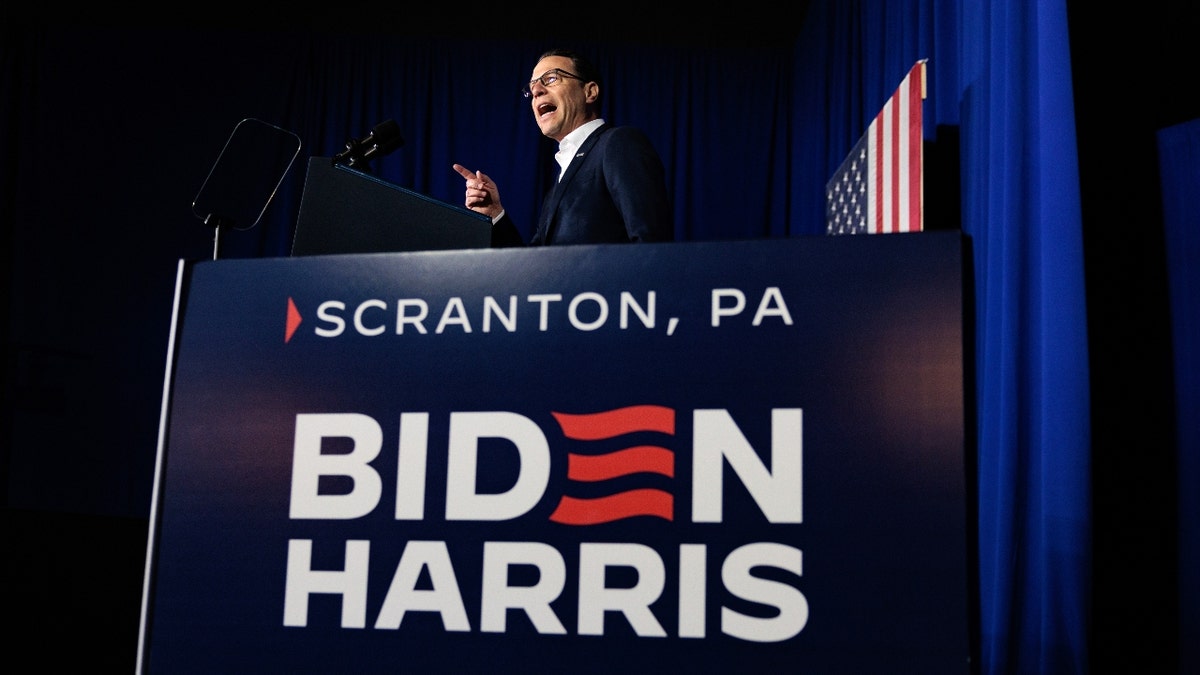
Josh Shapiro, governor of Pennsylvania, speaks during a campaign event at the Scranton Cultural Center at the Masonic Temple in Scranton on April 16, 2024. (Hannah Beier/Bloomberg)
2016
Shapiro, now 51, ran for Pennsylvania’s attorney general in 2016 after Kathleen Kane resigned after her convictions for perjury, obstruction of justice and other crimes. He has expressed opposition to the death penalty, effectively continuing former Gov. Tom Wolf’s moratorium on the practice.
Prior to winning the AG election, he worked for corporate law firm Stradley, Ronon, Stevens & Young in Philadelphia.
The same year he won the title of top prosecutor, he launched an investigation into thousands of sexual assault allegations made against more than 300 Catholic priests in Pennsylvania and across the United States. Shapiro publicized the lengthy grand jury investigation findings for the public to read.
2017
In 2017, Shapiro was sworn in and successfully arrested dozens of people involved in a drug trafficking scheme in Wilkes-Barre and Luzerane County known as the “million dollar heroin ring.” His investigation, which began in 2016, ultimately led to the arrests of 36 suspects accused of dealing heroin and crack cocaine.
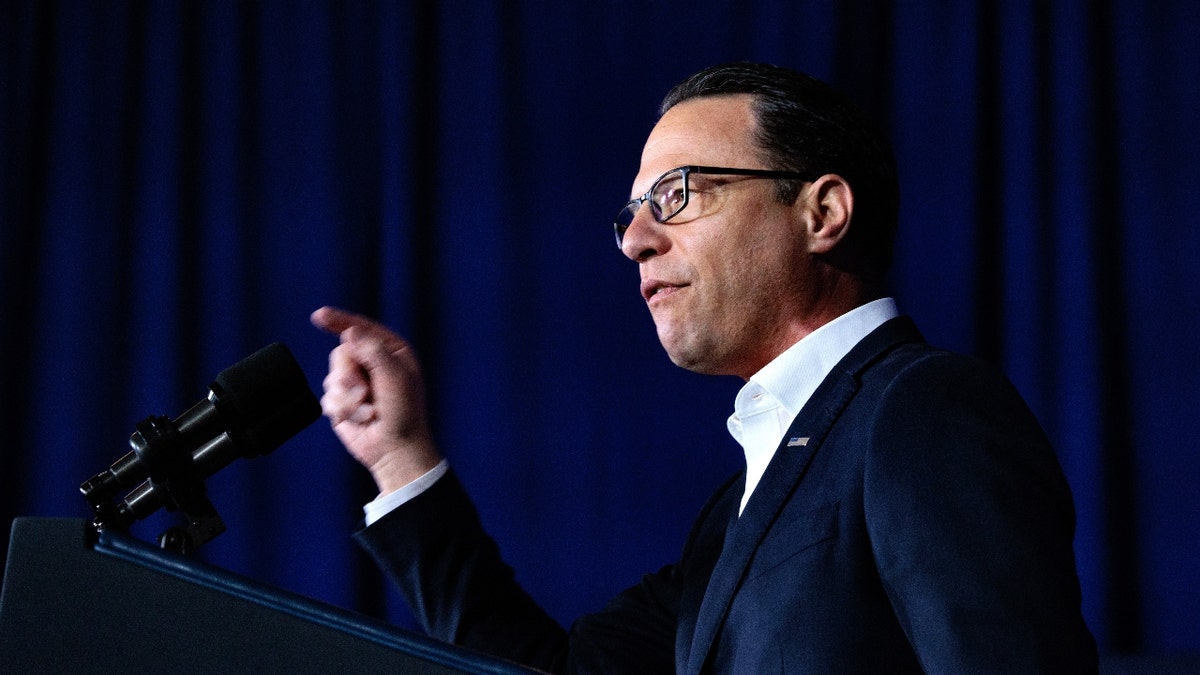
Josh Shapiro, governor of Pennsylvania, speaks during a campaign event at the Scranton Cultural Center at the Masonic Temple in Scranton on April 16, 2024. (Hannah Beier/Bloomberg)
STATE DEMOCRATIC LEADERS RALLY BEHIND BIDEN AFTER PARTY CHAIR SUGGESTS GOP PULL TRUMP’S NOM
“This ring of drug dealers was selling thousands of dollars’ worth of heroin and crack cocaine every day for more than a year – infecting Wilkes-Barre and the surrounding communities until we put a stop to it,” Shapiro said at the time. “The people of Luzerne County are fed up with the peddling of this poison in their communities. We hear you and today, we took 36 more dealers off the streets of Northeastern Pennsylvania.”
2018
The next year, Shapiro took over prosecution for a Penn State hazing death case in Contre County.
Shaprio ultimately got a 21-year-old member of the Beta Theta Pi fraternity involved in the 2017 hazing death of Penn State student Tim Piazza to plead guilty to four counts of hazing and five counts relating to unlawful acts involving liquor.
JOSH SHAPIRO TELLS TRUMP TO STOP ‘S—TALKING AMERICA,’ ‘TRYING TO DIVIDE US’
In March 2018, he also got the former Bedford County District Attorney to plead guilty to 11 counts related to political corruption for protecting drug dealers from criminal prosecution.

President Biden and Pennsylvania Gov. Josh Shapiro visit a coffee shop in Harrisburg on July 7, 2024. (SAUL LOEB/AFP)
2019
Shapiro and New Jersey Attorney General Gurbir Grewal sued the Trump administration and won a nationwide injunction blocking then-President Trump from implementing religious and moral exemptions that would allow companies to opt out of providing insurance to female employees for no-cost birth control.
“Women need contraception for their health because contraception is medicine, pure and simple. Families rely on the Affordable Care Act’s guarantee to afford care; before the ACA, families spent thousands of dollars in co-pays,” Shaprio said at the time. “Congress hasn’t changed that law, and the President can’t simply ignore it with an illegal rule. I will not allow the federal government – under the direction of the Trump Administration – to undermine the rights of women and violate the rule of law.”
PA GOV. SHAPIRO PROPOSES PLAN TO MAKE POWER PLANTS PAY FOR GREENHOUSE GASES
2020
Initially, during the COVID-19 lockdowns of 2020, when approximately a third of Pennsylvania businesses shuttered under local mandates, Shapiro encouraged Pennsylvanians to report neighbors and businesses in violation of lockdowns, as Reason magazine notes.
“See a #COVID19 health and safety violation? Report it!”
His office stood by former Gov. Tom Wolf’s lockdown rules and went to state and federal court to pursue business owners who were not following guidelines.
However, in a 2022 interview with the Associated Press, Shapiro shared that he thinks the lockdowns that shuttered schools and businesses were “an area where … folks got it wrong.”
After the death of George Floyd later on in 2020, Shapiro worked with Wolf to help pass a statewide police misconduct database.
“After George Floyd and Walter Wallace … at that time, we had Republicans controlling the House and the Senate. With his leadership as attorney general, speaking up, he helped us get important reforms and make sure that all police officers had to be properly trained,” Street said.
IN 2024, PA GOV. SHAPIRO WILL FACE DEMANDING SCHOOL FUNDING CHALLENGES, PREPARE FOR PRESIDENTIAL ELECTION
As governor, much of Shapiro’s focus has been on improving police recruitment and retention.

Vice President Harris hugs then-Pennsylvania Attorney General Josh Shapiro at Pittsburgh International Airport on June 21, 2021. (BRENDAN SMIALOWSKI/AFP)
“Governor Shapiro believes Pennsylvanians deserve to be safe and feel safe in this communities, and he is working to build safer communities by supporting the work of law enforcement and first responders, investing in our communities, promoting anti-violence initiatives, and pursuing smart reforms to keep people safe across the Commonwealth,” his website currently states.
Also in 2020, Shapiro worked with Wolf on a 10-year contract between Highmark patients and University of Pittsburgh Medical Center to ensure that Highmark patients could receive care from UPMC doctors after the networks split. After the split, patients covered by Highmark insurance would have lost access to care at 11 hospitals before Shapiro got them to reach an agreement.
2021
In 2021, Shapiro and other attorneys general from 47 states secured a $573 million settlement with McKinsey & Company, a consulting firm that helped fuel the opioid crisis by promoting certain drugs and profiting off the drug addiction that boosted sales of those drugs.
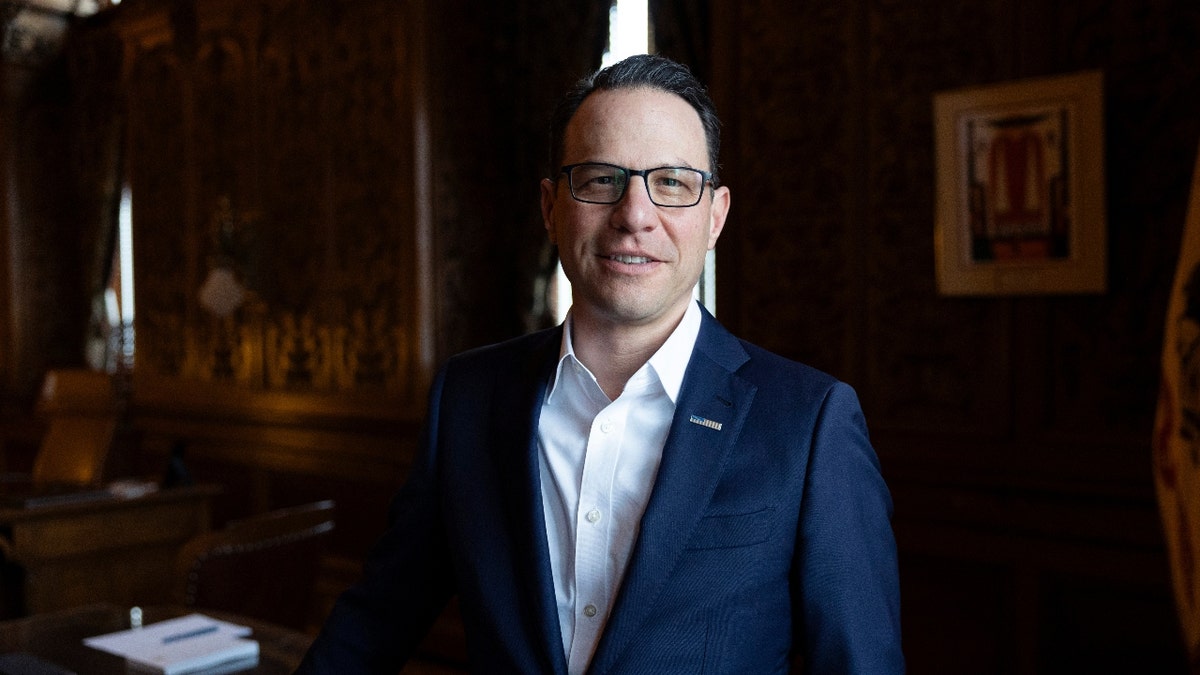
Josh Shapiro (Rachel Wisniewski/Bloomberg)
He also worked with 45 other AGs to reach a $120 million opioid settlement agreement with Johnson & Johnson and DePuy.
2022
The following year, Shapiro targeted those fueling the opioid crisis again, announcing that he finalized agreements with CVS and Walgreens for Pennsylvania to receive more than $450 million in opioid settlement funds.
HARRIS SNUBS ONE OF THE FEW DEMS OPEN TO BEING HER VP: REPORT
“No amount of money will bring back the lives we lost, but today’s agreement with CVS and Walgreens will help to ensure Pennsylvanians suffering from opioid addiction get the treatment and recovery resources they need,” Shapiro said in a statement. “My office is determined to hold accountable the greedy companies that created and jet-fueled the opioid epidemic. Today’s action sends a message to drug distributors and pharmaceutical companies that we’re here to always fight for the people we serve.”
2023
Shapiro won Pennsylvania’s gubernatorial race in 2023.
In perhaps the most controversial event to hit Shapiro since he became AG in 2016, his office agreed to pay $295,000 in September to quietly settle a sexual assault case brought against a close and trusted adviser, Mike Vereb, as Spotlight PA reported at the time, citing documents obtained through a records request.
In an interview with Politico last year, Shapiro did not address the accusations outright but pointed to his record defending victims of sexual assault.
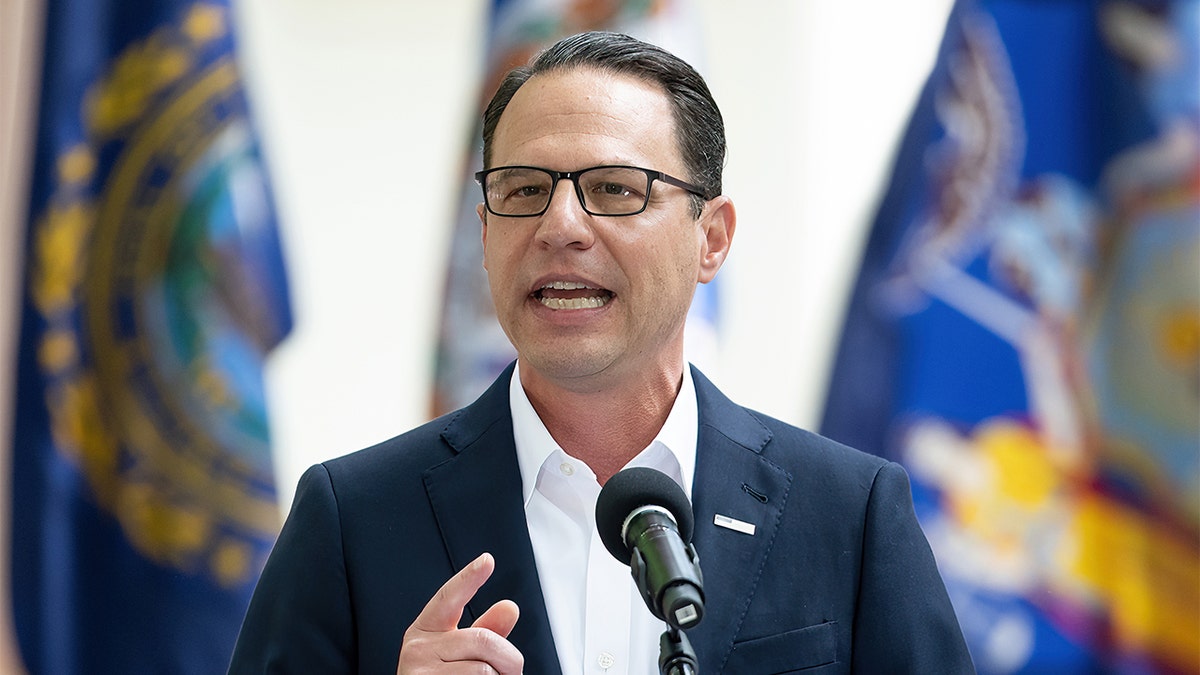
Pennsylvania Gov. Josh Shapiro is seen at the Celebration of Freedom ceremony during Wawa Welcome America on July 4, 2023, in Philadelphia. (Gilbert Carrasquillo/GC Images)
“I have a long and extensive track record of standing up for victims of sexual abuse, harassment. I led, I think, the most comprehensive investigation on behalf of victims of clergy sex abuse, prosecuted hundreds of sexual predators,” he told the outlet. “I have done extensive work with victims, listening to their stories, investigating their stories, and standing up for them. So I’ll take a back seat to no one when it comes to standing up for victims.”
HEAD HERE FOR THE LATEST FOX NEWS REPORTING ON HARRIS REPLACING BIDEN AS THE DEMOCRAT’S 2024 PRESIDENTIAL NOMINEE
Trecce says Shapiro “did not stick his hand in the hornet’s nest of any case that one might end up getting stung by.”
“He’s not despised by conservatives,” and he’s well-liked among Democrats, Trecce said.
CLICK HERE TO GET THE FOX NEWS APP
Street said Shapiro has “throughout his career has brought people together.”
Get the latest updates from the 2024 campaign trail, exclusive interviews and more at our Fox News Digital election hub.
-

 World1 week ago
World1 week agoOne dead after car crashes into restaurant in Paris
-

 Midwest1 week ago
Midwest1 week agoMichigan rep posts video response to Stephen Colbert's joke about his RNC speech: 'Touché'
-

 News1 week ago
News1 week agoVideo: Young Republicans on Why Their Party Isn’t Reaching Gen Z (And What They Can Do About It)
-

 Movie Reviews1 week ago
Movie Reviews1 week agoMovie Review: A new generation drives into the storm in rousing ‘Twisters’
-

 News1 week ago
News1 week agoIn Milwaukee, Black Voters Struggle to Find a Home With Either Party
-

 Politics1 week ago
Politics1 week agoFox News Politics: The Call is Coming from Inside the House
-

 News1 week ago
News1 week agoVideo: J.D. Vance Accepts Vice-Presidential Nomination
-

 World1 week ago
World1 week agoTrump to take RNC stage for first speech since assassination attempt



















